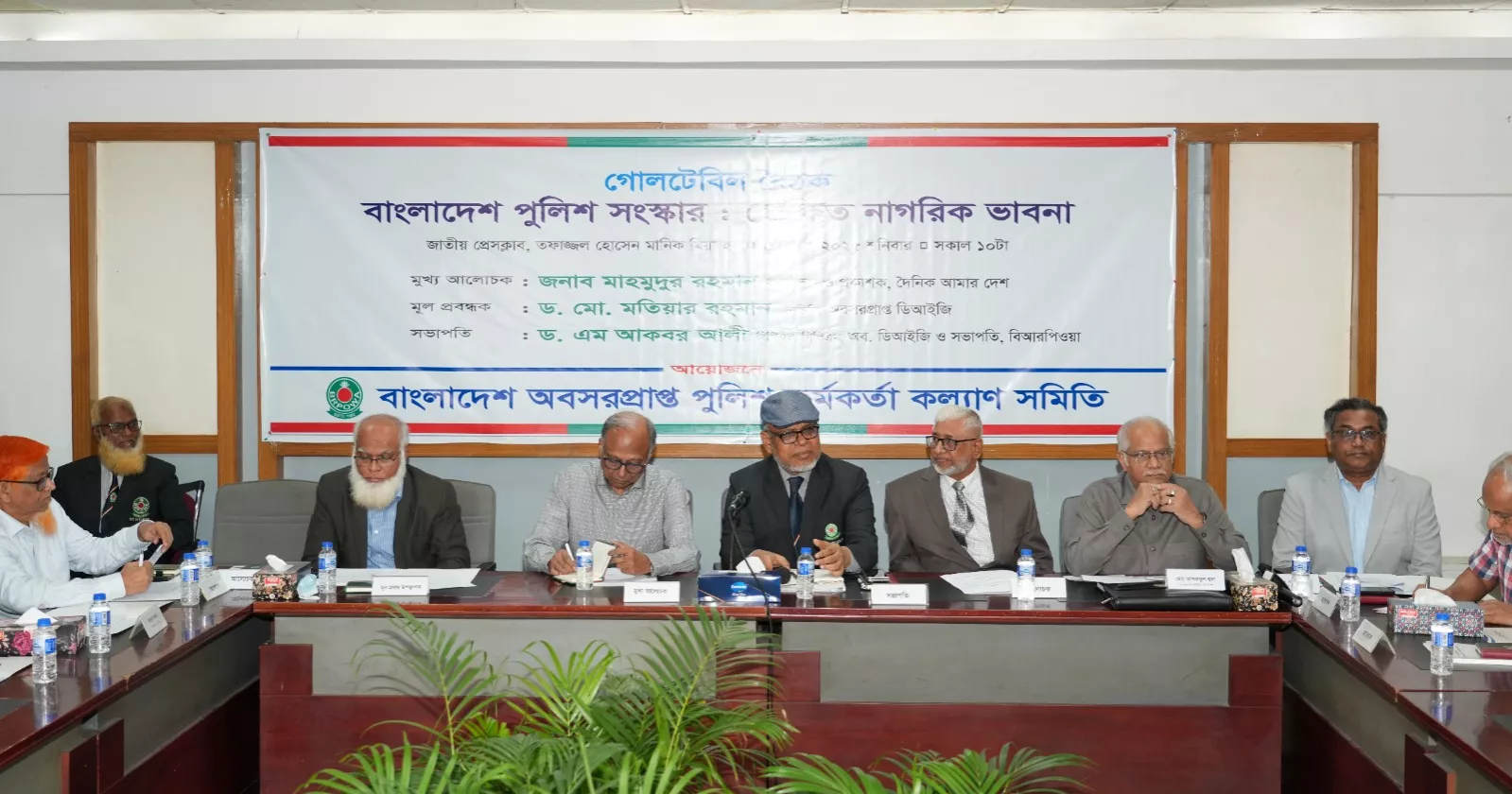Speakers at a roundtable discussion on Saturday opined that reform is essential to transform the Bangladesh Police into a truly people-friendly and humane force.
Organized by the Bangladesh Retired Police Officers Welfare Association, the event titled “Bangladesh Police Reform: Citizens' Perspective” was held at the Tofazzal Hossain Manik Miah Hall of the National Press Club, with the association’s president, retired DIG M Akbar Ali, in the chair.
Retired DIG Md Motiar Rahman presented the keynote paper, while Mahmudur Rahman, editor and publisher of the daily ‘Amar Desh’, attended as the main speaker.
The event was moderated by the association’s vice president Md Abdur Rahman Khan, and former IGP Ashraful Huda delivered the welcome speech.
Participants included former justices, civil servants, academics, journalists, political leaders, and other members of civil society.
Press Secretary for critical assessment of journalism during AL regime
In his keynote, Retired DIG Motiar Rahman highlighted key challenges facing the police force, including a colonial legal structure, shortages in human resources and technology, lack of accountability, corruption, excessive workload, and mental health concerns.
To address these, he proposed comprehensive reforms such as enacting modern and people-oriented laws, ensuring transparency and accountability, enhancing training and attitudinal change, free the police from political interference, implementing community policing, increasing use of technology, and building a disciplined, service-oriented force.
He also emphasized the urgent need for an independent Police Commission to monitor the force impartially and recommended that such a commission should include former and current justices, government officials, human rights activists, journalists, women, and civil society representatives.
"A safe, peaceful, and developed Bangladesh depends on a police force that upholds the values of independence, democracy, and human rights," he added.
Amar Desh Editor Mahmudur Rahman stressed the importance of depoliticizing the police and ensuring that officers are provided with adequate welfare and training opportunities.
He called for the withdrawal of military officers from RAB, and for modern and context-specific training for police personnel.
He urged the interim government to implement these reforms and also proposed the creation of a separate internal accountability committee within the police.
"The decline in police integrity is a result of political interference," he said. "If we are to hold free and fair elections, we must restore the morale of the police," he added.
Mahmudur Rahman also claimed that during Prime Minister Sheikh Hasina’s tenure, there was a breakdown of the chain of command within the police.
He criticized past police actions prior to what he described as the "July Revolution" and said that restoring public trust in the police is a major challenge for any interim government.
Recalling his own experience in police remand, he questioned whether the current crisis of police image was solely the force’s fault, suggesting that political affiliations of officers in detective branches contributed to the issue.
"Our goal is now to ensure that fascism does not return," he stated.
Prof. Dr. Borhan Uddin from the University of Dhaka’s Law Department emphasized the need for a separate legal framework governing police promotions and postings.
He noted that no government is likely to voluntarily establish a Police Commission and called for demilitarization of police equipment.
Ahmed Abdul Kader, Secretary General of, Khelafat-e-Majlish said that police must not be used to serve ruling party interests and essential reforms are necessary.
Zarif Rahman, a member of the Police Reform Commission, said that removing police reform from the national consensus agenda would be a betrayal of the July Movement.
Former Justice Farid Ahmed stressed that police reform has become unavoidable due to the controversial role of the force played during past governments.
Among others, Prof. Dr. Mohammad Kamrul Ahsan, Vice Chancellor of Jahangirnagar University; Barrister Asaduzzaman Fuaad, General Secretary of AB Party; BNP’s Information and Research Secretary Azizul Bari Helal; Prof. Md Shariful Islam from the Department of Political Science at Dhaka University; and Dr. Mohammad Tarikul Islam, Professor of Government and Politics at Jahangirnagar University also spoke in the programme.
